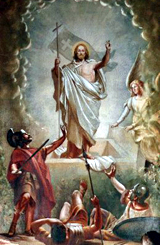Creed summarizes Chistian Faith
From. the beginning, thé apostolic Church expressed and handed on her faith in brief formula normative for all. But already very early on, the Church also wanted to gather the essential elements of her faith into organic and articulated summaries, intended especially for candidates for Baptism.
Such syntheses are called "professions of faith" since they summarize the faith that Christians profess. They are called "creeds" on account of what is usually their first word in Latin: credo ("I believe"). They are also called "symbols of faith".
The first "profession of faith" is made during Baptism. The symbol of faith is first and foremost the baptismal creed. Since Baptism is given "in the name of the Father and of the Son and of the Holy Spirit", the truths of faith professed during Baptism are articulated in terms of their reference to the three persons of the Holy Trinity.
Through the centuries many professions or symbols of faith have been articulated in response to the needs of the different eras: the creeds of the different apostolic and ancient Churches, e.g., the Quicumque, also called the Athanasian Creed; the professions of faith of certain Councils, such as Toledo, Lateran, Lyons, Trent; or the symbols of certain popes.
None of the creeds from the different stages in the Church's life can be considered superseded or irrelevant. They help us today to attain and deepen the faith of all times by means of the different summaries made of it.
Among all the creeds, two have a special importance in the Church's life:
- The Apostles' Creed is so called because it is rightly considered to be a faithful summary of the apostles' faith. It is the ancient baptismal symbol of the Church of Rome. Its great authority arises from this fact: it is "the Creed of the Roman Church, the See of Peter the first of the apostles, to which he brought the common faith".
- The Niceno-Constantinopolitan or Nicene Creed draws its great authority from the fact that it stems from the first two ecumenical Councils (in 325 and 381). It remains common to all the great Churches of both East and West to this day.
